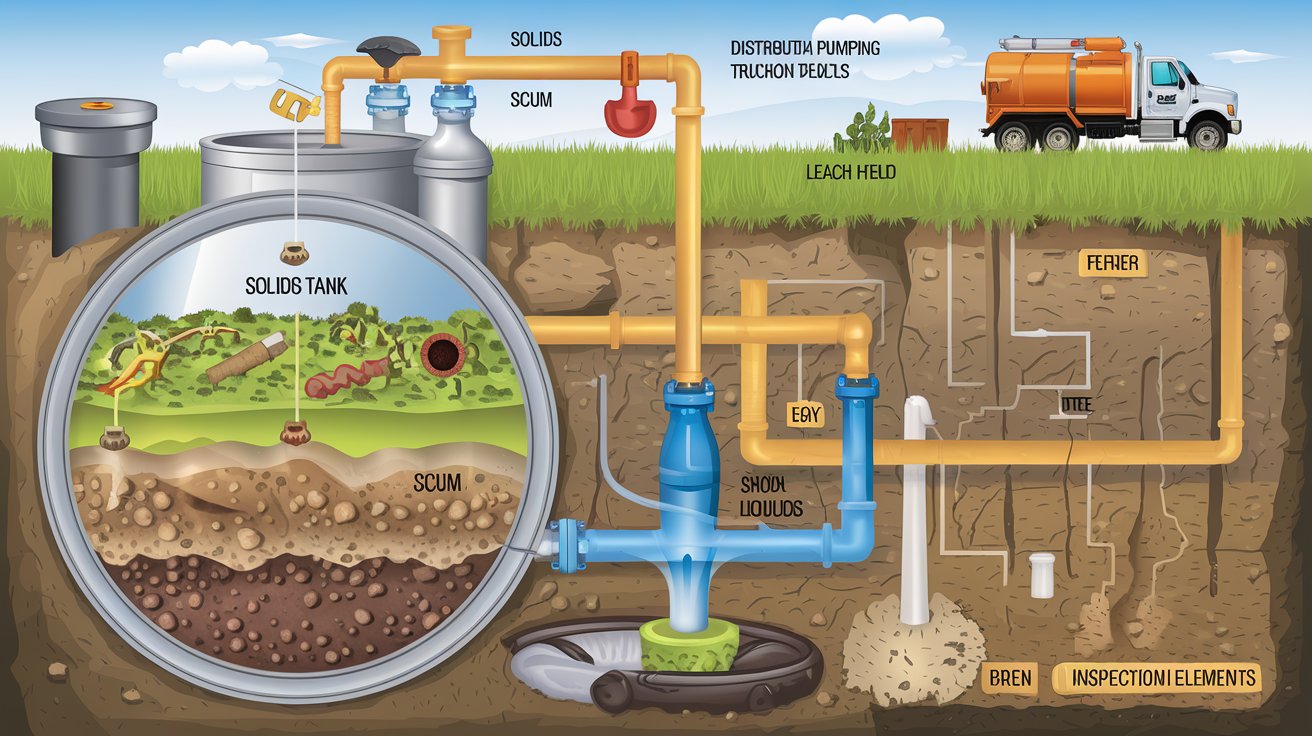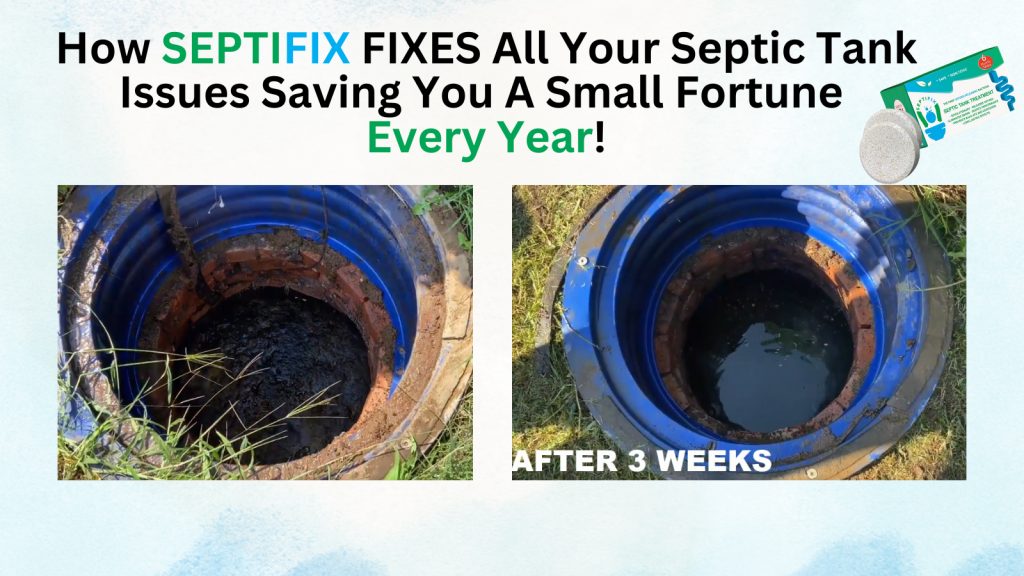Why Regular Pumping and Maintenance Are Essential for Septic System Health
Many homeowners mistakenly believe that septic tanks never need maintenance. It’s a common myth, but it couldn’t be further from the truth. While septic systems are designed to last for years, neglecting regular maintenance can lead to costly and disastrous problems. Without proper care, solids can build up, drain fields can fail, and costly repairs become inevitable.
Table of Contents
- Why Regular Pumping and Maintenance Are Essential for Septic System Health
- The Truth Behind the Myth
- Key Reasons Why Septic Tanks Need Regular Maintenance
- Signs Your Septic Tank Needs Maintenance
- What Regular Maintenance Involves
- Debunking Common Septic Tank Myths
- FAQs About Septic Tanks Maintenance
- Septifix
- Septic Permit Links by State
In this article, we’ll debunk the myth that septic tanks are maintenance-free and explain why regular pumping and care are essential. You’ll learn how a well-maintained system prolongs the life of your septic tank, protects your property, and ensures compliance with local health regulations. Let’s dive in and explore the importance of keeping your septic system in top shape.
The Truth Behind the Myth
Why Do People Believe Septic Tanks Never Need Maintenance?
Many homeowners assume that once a septic system is installed, it operates independently without requiring much attention. This belief often stems from a lack of visible problems or issues in the early stages. If everything seems fine, it’s easy to think that no action is necessary.
Some believe their system is “self-cleaning” and that solids will break down naturally over time. Others simply don’t understand how a septic system actually works. These misconceptions can result from misinformation, DIY advice, or a general lack of awareness about septic system components and their functions.
However, the reality is far from this belief. A septic system requires ongoing care and maintenance to function efficiently and avoid costly breakdowns. Ignoring regular maintenance can lead to clogs, overflows, and even long-term environmental damage. Let’s break down why this myth is misleading and why proactive maintenance is crucial for a healthy septic system.
Key Reasons Why Septic Tanks Need Regular Maintenance
1. Prevent Sludge Buildup
Over time, solids accumulate in your septic tank, forming a layer of sludge at the bottom. This buildup is made up of organic materials that don’t break down completely. If left unchecked, sludge can take up too much space in the tank, reducing its capacity and efficiency.
When the sludge layer grows too thick, it can block the tank’s inlet and outlet pipes, leading to backups and slow drainage throughout your home. Regular pumping ensures that solids are removed before they create significant problems, maintaining the tank’s functionality and longevity.
2. Protect Your Drain Field
Your drain field is a crucial part of your septic system. It disperses wastewater into the ground, filtering harmful bacteria and preventing pollution of nearby water sources. A healthy drain field ensures that wastewater is safely and effectively treated before it enters the environment.
If the septic tank isn’t properly maintained, untreated solids and sludge can overflow into the drain field. This contaminates the soil, kills helpful microorganisms, and leads to system failure. A failing drain field not only creates a mess but can also result in costly repairs and environmental hazards.
3. Extend the Life of Your Septic System
Regular maintenance prolongs the life of your entire septic system. A well-maintained system experiences less wear and tear, meaning fewer repairs and replacements are needed.
For instance, professional septic pumping removes solids and sludge before they cause damage to tank components. Inspections check for issues like cracks, baffle deterioration, or worn-out pipes. Preventive maintenance minimizes the risk of costly breakdowns, saving homeowners significant time and money.
4. Comply with Local Health Regulations
Most states, including Michigan, have strict health department guidelines for septic system maintenance. These regulations are designed to protect public health and the environment. Failing to follow these guidelines can result in fines, legal penalties, and even forced system replacements.
Local health departments often recommend regular septic tank pumping, inspections, and adherence to wastewater management best practices. Keeping your system compliant ensures you follow Michigan wastewater management laws and avoid potential legal complications.
Regular maintenance not only safeguards your system but also demonstrates responsibility as a homeowner in adhering to state and local environmental regulations.
By understanding these key reasons, it becomes clear that septic tanks never truly remain maintenance-free. Ignoring regular care invites costly repairs, environmental risks, and compliance issues. A proactive approach, with regular pumping and professional inspections, ensures your system remains efficient, environmentally safe, and compliant with local guidelines.
Signs Your Septic Tank Needs Maintenance
Recognizing early warning signs can save you time, money, and prevent significant septic system disasters. By paying attention to these common indicators, you can address issues before they escalate into costly problems. Here are the key signs that your septic tank may require immediate attention:
Unpleasant Odors Around Your Property
One of the most noticeable signs of a septic tank issue is a strong, foul odor near your septic tank or drain field. If you detect a persistent sewage smell in your yard or around your home, it’s a clear indication that your system isn’t functioning properly.
This smell typically occurs when the tank is full, solids overflow, or the drain field becomes saturated. Ignoring these odors could mean a system backup or an environmental contamination problem.
Slow Drainage in Toilets, Sinks, and Showers
If you notice slow drainage in toilets, sinks, showers, or bathtubs, it’s time to check your septic system. Slow drainage often occurs when solids build up in the septic tank, causing clogs in the inlet and outlet pipes.
These clogs prevent wastewater from flowing smoothly through the system, which can result in backups. Prompt maintenance can clear these blockages and restore the system’s functionality.
Water Pooling in Your Drain Field Area
Another sign of septic system trouble is water pooling on your drain field. If you see standing water, especially after heavy rainfall or a full septic tank, it indicates that your drain field is not functioning correctly.
Pooling water can occur when the soil becomes saturated with untreated wastewater, preventing proper drainage. This problem not only damages the environment but also compromises the effectiveness of your septic system.
Green Grass or Abnormally Healthy Vegetation
If you observe unusually lush or green grass growing over your drain field, it could mean that wastewater is overflowing into the area. The excessive nutrients in the wastewater promote healthy vegetation growth, but it’s a clear sign that your system is malfunctioning.
While vibrant grass might seem appealing, it indicates a serious issue where wastewater is not being properly treated or dispersed. This can result in environmental contamination and costly repairs.
Frequent Backups in Household Plumbing
Regular plumbing backups, especially in toilets and sinks, are a strong indication of septic system problems. These backups occur when solids or sludge clog the pipes between your home and the septic tank.
If wastewater backs up into your home, it’s a sanitary issue that poses health hazards. Ignoring these backups can lead to serious plumbing repairs and damage to floors, walls, and fixtures.
By recognizing these signs, homeowners can take preventive measures to address septic tank issues before they become catastrophic. Regular maintenance, inspections, and professional pumping ensure that your system stays in good working order, protecting your home, wallet, and the environment.
What Regular Maintenance Involves
Regular maintenance is crucial for keeping your septic system functioning efficiently and preventing costly repairs. Here’s a breakdown of the key components of a thorough septic maintenance routine.
1. Pumping Your Septic Tank
Pumping your septic tank is one of the most important aspects of regular maintenance. A septic tank should be pumped every 2 to 3 years, depending on the household size and usage.
Why Pumping is Necessary:
- Over time, solids accumulate at the bottom of the tank, reducing its capacity.
- If solids build up too high, they can clog the pipes and drain field, leading to backups and system failure.
- Regular pumping removes solids before they cause significant damage, ensuring your septic system remains functional.
Hiring a professional septic service ensures that your tank is pumped thoroughly and any potential issues are identified during the process.
2. Professional System Inspections
Regular professional inspections are another critical component of septic system maintenance. A certified technician can evaluate your system’s condition and identify issues before they escalate.
What Technicians Check During Inspections:
- Tank Walls and Baffles: Checking for cracks, corrosion, or wear.
- Pipes and Connections: Ensuring proper alignment and flow of wastewater.
- Inlet and Outlet Areas: Assessing for clogs or blockages that could cause backups.
- Drain Field Health: Examining soil condition, water pooling, and vegetation growth.
These inspections help catch problems early and prevent costly repairs, extending the life of your system.
3. Septic System Treatments
In addition to regular pumping and inspections, septic treatments can help maintain your system’s health. These treatments typically contain beneficial bacteria and enzymes that break down solids and organic material, promoting a smoother operation.
Types of Septic Treatments:
- Biological Additives: These introduce bacteria that break down solids in your tank.
- Enzymatic Treatments: These help digest organic materials quickly, maintaining a clean system.
- Chemical Treatments: While useful, they should be used with caution to prevent harming the natural bacterial balance of your septic system.
Consult with a septic professional before using treatments to ensure you select the right product for your system and follow proper application guidelines.
4. Routine Maintenance Best Practices for Homeowners
While professional maintenance is essential, homeowners can take proactive steps to maintain their septic system effectively. Here are some simple practices to follow:
- Limit Water Usage:
- Avoid overloading your system by using water efficiently.
- Fix leaks in toilets, sinks, and showers promptly.
- Use water-saving fixtures to reduce wastewater output.
- Avoid Flushing Harmful Items:
- Never flush items like wipes, chemicals, and non-biodegradable products.
- These items can clog pipes and disrupt the breakdown of solids in your tank.
- Be Mindful of Household Waste:
- Use garbage disposals sparingly. While convenient, they introduce extra solids into your septic system.
- Properly dispose of kitchen waste and consider composting organic materials instead.
- Maintain Vegetation Around Your Drain Field:
- Plant grass or low-root plants over the drain field area to prevent soil erosion.
- Avoid planting trees or shrubs, as roots can damage pipes and the septic tank structure.
By incorporating these simple habits into your daily routine, you can support the overall health and longevity of your septic system while minimizing the need for costly repairs and professional intervention.
Regular septic system maintenance, professional inspections, and proactive habits are the foundation of a well-functioning system. These efforts not only prevent expensive repairs but also help protect the environment and adhere to state and local guidelines.
Debunking Common Septic Tank Myths
There are numerous misconceptions about septic tanks that often lead homeowners down the wrong path. Let’s tackle some of the most common myths to clarify what really matters when it comes to septic system maintenance.
Myth #1 – Septic Tanks Are Self-Cleaning
Many homeowners believe that their septic tank cleans itself naturally, requiring no intervention. This belief is widespread but ultimately incorrect.
The Truth:
- While natural bacteria in the tank break down solids, septic tanks do not clean themselves completely.
- Over time, solids accumulate at the bottom of the tank, forming a thick sludge layer.
- If not pumped out regularly, this sludge can overflow into the pipes and drain field, causing backups and system failure.
Regular septic tank pumping and maintenance are necessary to remove solids before they clog the system or contaminate the environment.
Myth #2 – If There Are No Visible Issues, My Septic Tank Must Be Fine
Many homeowners assume that if their toilets and sinks are draining without problems, their septic system is functioning well.
The Truth:
- A malfunctioning septic system often doesn’t show immediate signs of trouble until it’s too late.
- Problems like sludge buildup, clogs, and drain field contamination can remain hidden until a backup or system failure occurs.
- By the time issues become visible, the system may already have irreversible damage, leading to costly repairs or replacements.
Regular inspections and preventive maintenance allow you to address issues early, ensuring your system remains in good working order before a problem arises.
Myth #3 – Septic Tank Maintenance is Expensive and Not Worth It
Many homeowners hesitate to invest in septic maintenance, believing the costs outweigh the benefits.
The Truth:
- Preventive maintenance actually saves money in the long run.
- Regular pumping, inspections, and treatments prevent minor issues from becoming major disasters.
- Preventing clogs, drain field damage, and system backups reduces the need for expensive emergency repairs and replacements.
- Compare the cost of regular maintenance to potential repair expenses—it often turns out to be far more economical to take preventive action.
Investing in regular maintenance ensures your septic system’s longevity and functionality while saving you from substantial financial burdens down the road.
Pro Tips for Maintaining a Healthy Septic System
While professional maintenance is essential, homeowners can also take simple steps to keep their septic system in top shape. Here are some actionable tips:
- Be Water-Wise
- Reduce your household water usage by fixing leaks and using water-efficient fixtures.
- Spread out laundry loads and dishwasher use throughout the week rather than running everything at once.
- Limit Garbage Disposal Use
- Use your garbage disposal sparingly, as it adds solids to your septic tank, which can overwhelm the system.
- Compost kitchen waste instead of relying on the disposal, which helps keep your system cleaner.
- Avoid Flushing Harmful Items
- Never flush items like diapers, wipes, chemicals, or feminine hygiene products.
- These items do not break down easily and can clog pipes and disrupt the natural bacterial balance in your septic tank.
- Plant Carefully Around the Drain Field
- Keep the area around your drain field clear of large plants and trees.
- Use grass or low-root plants to prevent root damage to pipes and maintain proper soil integrity.
- Conduct DIY Checks Periodically
- Occasionally, check your drain field and the surrounding area for unusual signs like standing water or lush grass growth.
- If you notice any issues, contact a septic professional promptly to prevent larger problems.
The myth that septic tanks never need maintenance is a dangerous misconception that can result in costly repairs and environmental hazards. Regular pumping, inspections, and proactive maintenance are crucial for maintaining a healthy septic system.
Ignoring these responsibilities can lead to problems such as sludge buildup, drain field contamination, and system failure. By following professional recommendations and adopting simple maintenance habits, homeowners can protect their investment, prolong the life of their septic system, and comply with local regulations.
FAQs About Septic Tanks Maintenance
Here are some frequently asked questions about septic tank maintenance and systems, along with answers based on reliable sources.
1. Do septic tanks ever need maintenance?
Yes, septic tanks require regular maintenance to prevent issues like clogs, backups, and system failure. Regular pumping and inspections are key to maintaining a healthy system Morris-Jenkins.
2. How often should you pump your septic tank?
Most homeowners should pump their septic tank every 3 to 5 years. However, this timeline depends on household size, usage, and tank capacity
3. Can a septic tank work without electricity?
Yes, a septic tank usually operates without electricity. Most of the wastewater treatment relies on gravity and natural bacterial processes. However, systems with components like aerators may require electricity
4. What happens if a septic tank isn’t pumped regularly?
If a septic tank isn’t pumped on time, solids accumulate at the bottom of the tank. This can result in clogs, backups, and untreated wastewater spilling into your yard
5. How do you maintain a healthy bacterial balance in your septic system?
To maintain a healthy bacterial balance, avoid introducing harmful substances like chemicals, grease, and non-septic-safe products. Use septic-safe cleaning supplies instead
6. What are common signs of a failing septic system?
Look for these warning signs:
- Foul odors around your property
- Slow-draining toilets and sinks
- Soggy areas in the yard
- Wastewater backups into your home
These issues typically indicate a malfunctioning septic system
7. Can septic tank additives improve system performance?
Septic tank additives are often unnecessary. The natural bacteria in a septic tank are usually enough to break down waste. Some additives can even disrupt the system’s bacterial balance About Septic Tanks.
8. How do you deal with septic odors in your yard?
To address septic odors, make sure your system has proper ventilation and a balanced bacterial environment. Regularly pumping the septic tank can also prevent odor issues Ky Septic Service.
9. Is it possible to increase the size of your septic tank?
Yes, you can increase your septic tank’s capacity by adding a larger tank or supplementary tanks. Work with a professional septic service to ensure your system complies with local guidelines and regulationsAbout Septic Tanks.
10. Do you need professional help for septic system installations and repairs?
Yes, hiring a professional septic service ensures your system is installed, maintained, and repaired correctly. These experts provide solutions that comply with local regulations and prevent costly issues down the line Morris-Jenkins.
Septic Tanks in Rural Areas: A Practical Guide for Homeowners
Directory | Wyoming Septic Service Providers : Best Professionals
Directory | Wisconsin Septic Service Providers | Part 3
Directory | Wisconsin Septic Service Providers | Part 2
Directory | Wisconsin Septic Service Providers | Part 1
Directory | West Virginia Septic Service Providers : Best Professionals
Winter Pumping: Should You or Shouldn’t You?
Septic Installer Registration in Bay County, Michigan
Septifix










